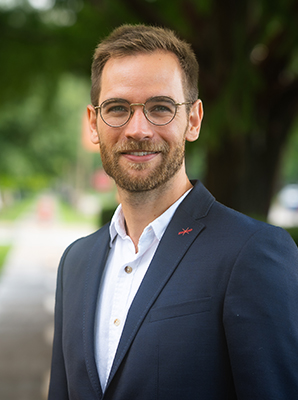
Sep 3, 2025 Accountancy Faculty Research in Education
Sebastian Stirnkorb ready to give back at Gies Business

Sebastian Stirnkorb is no stranger to the University of Illinois. His five months as a visiting scholar at Gies College of Business during his PhD at Erasmus University’s Rotterdam School of Management made a lasting impression on him. The atmosphere was grounded, collaborative, and ambitious without pretense. Years later, when a faculty position opened, coming to Gies Business was a natural choice.
"I had already worked with a number of Gies faculty, and I've spent time in Urbana-Champaign,” Sebastian said. “The opportunity to come back was one I couldn’t pass up. I’m excited to join a community I already know is so grounded, respectful, and hardworking."
That fit is paired with a rare and precise research identity. Sebastian, who joined Gies this fall as an assistant professor of accountancy, is one of a small number of scholars who apply market-based experimental economics methods to financial accounting, which allows him to study market behavior in a way most accountancy researchers can't. His approach is designed to capture how information is aggregated, anticipated, and acted upon in real trading.
"In the real world, there's so much we can't observe," he said, "especially when it comes to retail investors. My methodology lets me observe strategic interactions, like how people aggregate and use information, or anticipate others' behavior. Or how all of that is reflected in trading."
That approach fuels projects with relevance beyond experimental economics. A recent research paper coauthored with Gies Business Executive Associate Dean of Faculty and Research Mark Peecher, accountancy PhD student Isaac Yamoah and Christian Pietsch (Erasmus University) found Sebastian examining how auditors respond to specialist advice grounded in AI - and how it might change their decisions.
"We showed that when auditors see AI-augmented specialist advice, they tend to discount it," Sebastian said.
The team traced this to a kind of aversion – seeing human advice supported by machine-generated advice as a “black box” and potential threat to professional expertise.
“The interesting thing is we observed that the effect actually disappeared when we invited the auditors to reflect on their strongest personal skill. Just thinking about what they're good at made them less defensive. We're offering a solution to audit firms that they can explore further."
The collaborative academic culture at Gies Business impacted Sebastian's trajectory long before he joined the faculty ranks. Working in a specialized experimental field can be isolating. For Sebastian, Gies is more than a job - it's a community, a network of inspiration. He credits parts of his development as a researcher to colleagues and coauthors like Mark Peecher and Jessen Hobson, who made collaboration a priority.
"I've learned a lot and I'm very thankful for what I learned from Jessen and Mark," he explained. "Despite their responsibilities, they always found time to give thoughtful feedback. I'm really looking forward to giving something back."
For Sebastian, Jessen Hobson was more than a collaborator, he was an influential mentor and friend. Hobson, who passed away in 2023, was known across Gies for his generosity with time, enthusiasm for innovation, and ability to inspire colleagues to push their research in new directions. For Sebastian, those conversations were encouragement in a small field, and a reminder that collaboration can be both productive and encouraging.
"As an experimentalist in financial accounting, you're already in a small niche," he said. "Then, even further, I chose experimental economics methodology. So being able to talk to Jessen was very motivating. Finding others who care about these questions meant a lot."
It's the kind of approach he wants to carry forward as he works with Gies PhD students - understanding the potential impact of a short, thoughtful conversation.
Looking forward, he's eager to explore the world of ESG reporting, where non-financial disclosures are reshaping what investors and auditors need to know to serve clients. ESG disclosures are different from traditional financial statements: fragmented, sometimes voluntary, with metrics that don't necessarily connect in predictable ways. For Sebastian, that complexity is exactly why an experimental lens can be helpful.
"I'm looking forward to exploring research connected to ESG reporting. I find it fascinating because I think it changes everything we know. And it's not necessarily interrelated the way financial information is. We're at the beginning of understanding how auditors determine materiality. How do they assess risks in that area?"
This fall, Sebastian will teach ACCY 405: Assurance & Attestation, a class he sees as fundamentally connected to the idea of building trust in markets and society.
"I'm very much looking forward to teaching again," Sebastian continued. "I've taught financial reporting, from introductory to advanced courses, and I'm excited to teach assurance and attestation. Because it's really about trust. How do we instill trust in society? How can we make sure investors can trust reported information? Given the times we're living in, that seems very useful."
That same instinct motivates his scholarship - looking closely at how information flows, how people respond, and how trust is built in the systems that connect them.
